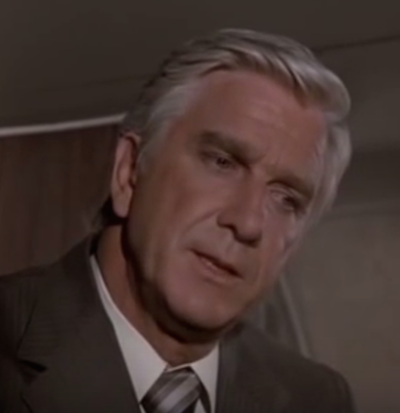Little Mercer defeating the Big Bad Duke. That stunning Laettner shot you prayed wouldn’t go in. Davidson paying for busloads of its students to attend the Elite Eight. If you were born near corn and have since transplanted to either coast, I don’t care how thin your grasp of the finer rules (a pick and roll?) or how few Big 10 games you’ve managed to catch on your TV. Come March, homesickness arrives in the form of a basketball hitting a gym floor. So you fill out two brackets (one with viable predictions, another with your 13-seed team triumphing), frantically text childhood friends, and download a NCAA app, hoping to recapture some of the thrill that is watching the Madness in the Midwest.
In my case, the outsized crankiness ushered in with Selection Sunday, as I rambled to all in ear range about the cruelties of New England living: hockey on the big screens and game commentary drowned out by 80s tunes in sports bars, radio stations blaring Spring Training garbage. Why hadn’t I flown to watch the games in Chicago again, as my two sisters and friend once had? So I decided in breaks between shouting over Cinderella beauties alone in my living room (with an occasional pity join-in by my uninterested spouse), I would console myself with a sports film. Since I already have viewed my favorites (Hoosiers & Hoop Dreams) many times, and classic basketball flicks are scarce, I chose the movie starring our former president and the much-loved other Midwestern sport, Knute Rockne-All American (1940).
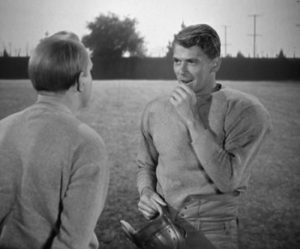
Pat O’Brien and Ronald Reagan in Knute Rockne-All American
It’s hard to believe now that Notre Dame was ever an underdog, but if you’ve been to South Bend, you understand: a sleepy town you wouldn’t know was there but for the golden dome, breathtaking church, and lovely campus buildings. Of course, once Rockne (Pat O’Brien) started making a name for himself and the school, he was lured by the big-name programs, but like many loyal coaches who followed him (I’m looking at you, Shaka Smart), he stayed put.
Of course, the whole beginning of the bio-flick, I was waiting for George Gipp (Ronald Reagan), the stunning athlete who would set off Rockne’s career in his four seasons of play (1916-1920). Though I expected it, I was startled to see the ex-president so young, handsome, and fit.
Gipper was an intriguing person, hardworking in games, but nonchalant about practice, and more committed to baseball than football. Particularly surprising was his habit of shying from the limelight: He was known for dodging reporters. The film doesn’t explore another interesting trait: he liked to gamble, fooling out-of-towners who suspected he was just a naïve hick. And then he quietly would give much of the money to those in need.
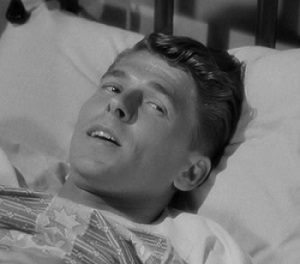
Reagan delivering Gipp’s famous speech
His famous sickbed speech was thankfully muted in the film, without crass Hollywood dramatization, and Reagan delivered the lines well: “Rock, some day when the team is up against it, when breaks are beating the boys, ask them to go in there with all they’ve got, win just one for the Gipper. I don’t know where I’ll be then. But I’ll know about it, and I’ll be happy.”
The rest of the movie is, as you would guess by its title, about Rockne rather than his illustrious player: the coach’s dedication to his team, the success of his program, and the sacrifices he made for his athletes. Rockne was renowned not only for popularizing the forward pass, but for his commitment to teamwork over individual talent. Sound familiar, NCAA basketball fans? In a funny scene, Rockne watches chorus girls and takes notes on their performance that will become the famous shift he teaches first his wife, and then his Four Horsemen (the gifted group who led the Fighting Irish to 28 wins and only 2 losses). How like a coach to appreciate the coordination of dancers. We always think of basketball in balletic terms too: seamless passes, graceful turns and fakes, fluid jumps to the rim.
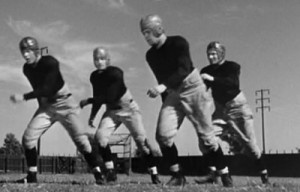
The Four Horsemen mid-shift
What I enjoyed most about Knute Rockne-All American was the man himself, especially his unusual, clipped patterns of speech and motion, which Pat O’Brien captures perfectly without ever slipping into parody. (See footage of the real man here.) Rockne’s intelligence is established early on, when a famous chemist in his department tries to turn him into one. But it’s his enthusiasm for his boys that gets you, even when his wife has to go without vacation for 17 years as a result (probably true since his widow was involved with the film and unlikely to forget such a betrayal). When Rockne disappoints his team with a bad decision, the devastation of this loyal coach is painful to watch.
The most celebrated moment in the film is when Rockne repeats Gipp’s words to his players in the locker room during a losing game. The scene is surprisingly understated, even for its time: No close-ups to show tears in the eyes of athletes. No uplifting music except for the muffled marching band in the background. No shouting. It feels less like a moment to rile up the team than the coach’s need to honor a promise. Affected as I was by the speech, I couldn’t refrain my dismay at the ways that modest athlete’s name has been abused since. Reagan—or his PR machine—used the line for political gain repeated times; our most camera-happy chief of state is now referred to as “The Gipper.”
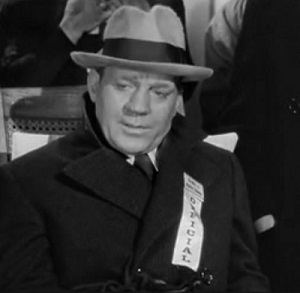
Rockne (O’Brien) delivering Gipp’s words
Late in the film, college football is accused of the usual: passing failing students, subsidizing players, subverting the intentions of an education, etc., so Rockne goes to New York to defend his team and football as a whole to a committee of educators investigating the charges. How disturbingly prescient the claims were. But Rockne’s defense is powerful, as when he’s asked whether he changes his athletes’ grades:
“Any player who flunks in his class is no good to his coach, nor to the school he attends. And any coach who goes around trying to fix it for his athletes to become eligible scholastically when mentally they’re not is just a plain everyday fool.”
Shortly afterward, a professor on the committee expresses his skepticism about sports: “Where do these elaborate spectacles of sport fit into the scheme of education?” he says. “How would you grade an average athlete’s contribution to the national intelligence?”
Rockne has spent his life answering this question, and does so now with spirit:
“…To limit a college education to books, classrooms, and laboratories is to give to education too narrow a meaning for modern times….We’ve tried to build courage and initiative and tolerance and persistence, without which the most educated brain of man is not worth very much….Now I don’t know, I don’t know how you grade a boy for learning these things, professor…But wouldn’t it be a good idea not to grade anybody’s contribution to the national intelligence, until all the results are in, maybe five or ten years after graduation, when his record and character are not hung on the wall like a diploma, but inside the man himself?”
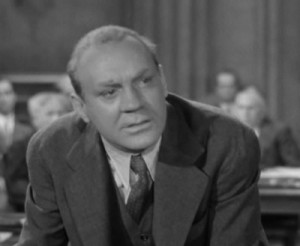
Rockne (O’Brien) defending football
I nearly cheered. I wonder if everyone could listen to Rockne’s words with as little cynicism as I did. But year after year, college athletes are among my hardest-working students, and former high school players write that their teams made them less selfish, more mature, stronger leaders, better people. And maybe that explains my bafflement that the New Englanders around me fail to embrace March Madness as I do, maybe thinking of it as only another gambling opportunity, another set of games, just brackets whole or broken. Perhaps they are too disgusted by the power and dollar signs we now associate with the NCAA to watch its most famous tournament, or think because appearances by most of their own teams are rare that it isn’t worth their time.
But I found in Knute Rockne-All American a perfect supplement to my March Madness optimism, which, despite my blues at being away from home, returned with the first upset. There are so few reliable forms of inspiration in our lives, and even fewer that we can experience collectively. But for a short span of weeks, even just a night, we can witness heart and teamwork triumphing over power and ability; we can experience a little school we’ve never heard of and players we’ve never seen get on that floor and ignore the hoopla and the lights and what big money has wrought—and just play. We watch these games expecting to be inspired. And like Rockne’s once-underdog team, with every play, with every goal, whether they win or lose, they deliver.
